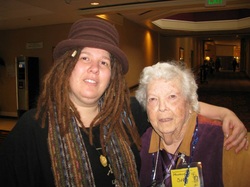
Growing up in a Northern California hippie family, I have always had a special affinity for nature. When I was a child we, my parents, myself, and my little sister had little money and we lived in a VW camper van in several campgrounds for quite a while, and later on a little farm in Oklahoma. My mother would often work as a waitress while my father stayed with us during the day. My father and I, and sometimes my little sister, supplemented the food my Mom brought home by foraging.
My father was no Euel Gibbons but he was a passable mountain man. We would fish and set out quail or rabbit traps in the morning and in the afternoon we would search the meadows and mountain slopes for wild edibles. We collected cactus, sorrel, pig weed, dandelions, mushrooms, fennel, blackberries, gooseberries, black walnuts, wild onions, wild garlic, tubers, miner's lettuce, and, of course, wild asparagus. Sometimes we had more food than we could eat, sometimes we didn't. I think this is when my real love and appreciation for nature began.
I have always felt at home in the wild, no matter the climate or terrain. So when I was first asked to write this article for ADF, one of the very first things I realized is that your relationship with nature spirits is one of hospitality. You are visiting them in their home and are, in a sense, a guest. So it seems natural that you would treat them with respect and thank them for allowing you to visit.
Likewise, when you are trying to establish a relationship with a person you visit with them frequently, invite them to lunch, and learn everything you can about their lives. You wouldn't call a neighbor that you wave at occasionally and visit only one or two times a year at neighborhood gatherings a friend. Neither should you consider visiting nature spirits once or twice a year the same as having a relationship with nature.
Besides treating nature with proper respect and reciprocating their hospitality, there are two major ways to establish a friendship or relationship with them; visit them and research them. First you can do a lot of research on native plants and animals in your area and how the native people from your area worked with them. You can also learn about the natural history of the area.
Second, you can spend time hiking and walking through the natural areas in your region. Find one or two areas that really feel nice to you or choose one that needs a little help and spend time learning every plant, rock, and animal in the area. The research will come in handy because it is nice to know if you are talking to a juniper or a pine tree. It is kind of rude to continue addressing "friends" by the wrong names. Doing this research also helps you to understand the relationship that the native people had with these plants. Are they edible? Were they used to make rope? Were structures often built from them? Were they used medicinally? Did the native people do any particular thanking ceremonies for the plants before or after harvesting them? This is the part where you learn all you can about your "friend's" history.
Spending time in nature will also help you to attune with the spirits of the place, also called spirits of locality. You can discover plants and stones that are just calling out to be talked to. You may discover a special place that you feel compelled to do an offering or even a ritual. You will learn the trails and which plants are at each turn. Over time you will be able to tell when plants are getting ready to bloom or send out new shoots and you will become used to subtle weather shifts and be able to tell when it is about to rain or even snow.
Once you have learned about the nature in your area and have spent time communing with the nature spirits of the area, doing a ritual to acknowledge the local nature and land spirits is a good step toward establishing a relationship with them. Try using divination in this ritual to determine if you are going in the right direction. Remember that we, humans, have done a lot of harm to the local nature and land spirits and in some cases have even driven away the native people who once honored and revered them. For these reasons they may not have reason to trust you initially. So don't be overly distressed if you don't get a positive divination the first time around. Continue working at the relationship and asking the nature spirits what they need from you.
Sometimes it is rather evident from the sad state of these natural areas what they need. Organize a monthly or weekly clean-up or work with an existing group. Carry garbage bags and latex gloves with you when you hike. Make offerings of bone meal or other fertilizing agents but try to steer clear of seeds. While seed, even bird seed, seems like a nice idea in your own yard, many are not native to the area you are hiking and are not appropriate offerings in the wild. Delicate ecologies often do not do well when invasive foreign species are introduced so please avoid anything not native that could germinate (trust me I've been part of eradication teams that are trying to deal with this type of problem, it is hard work).
You may want to consider journalling your experience and taking photographs of area that you are working with so that you can see how far your efforts have taken you. Volunteering with local trail guide groups and giving classes on local ecology, water conservation, geology, or geography are also great ways to get in tune with nature and the spirits of locality. As a guest lecturer I am often surprised by how much I learn from my students and how often I discover new and wonderful places from people who have lived in the area much longer than I have.
All this may seem a bit complicated but it isn't really. Basically, a good relationship with nature and the nature spirits of your area is the same as a relationship with a good friend. You talk to them often, share things with them, respect them, help them, and love them. After all, isn't that what our Earth needs more of? Love.










 RSS Feed
RSS Feed
